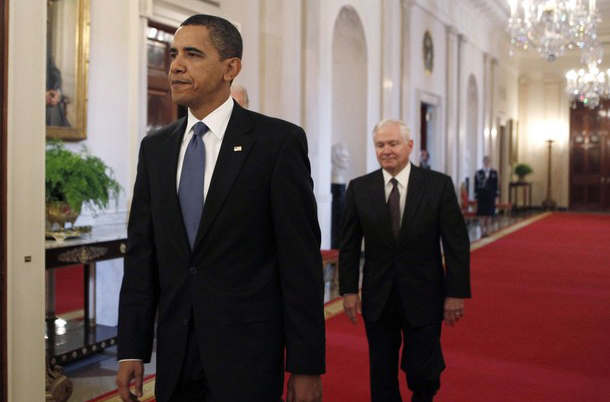
For all the talk around town of increasing pressure on defense spending in a time of austerity, high unemployment and eye-popping deficits, the Pentagon budget is poised to reach the historic level of $700 billion – a 4.8 % increase over Obama’s FY2010 request (and a 125% increase since 2001).
While the public perception of the Obama agenda is dominated by domestic issues such as health care, economic stimulus and energy policy, his recent decisions to surge forces into Afghanistan, personally handle the review of the Christmas attempted-bombing incident and now boost war funding are beginning to burnish the young President’s national security credentials.
While the Administration won’t release official figures until it rolls out the budget on February 1, Admiral Mike Mullen’s recent public comments left many with the impression that DOD’s budget is shrinking. Reuters reports him as saying, "I don’t anticipate that the money is going to go up. In fact, I anticipate it’s probably going to go in the next couple of years in the other direction." While that forecast will play out in subsequent budget cycles, the Obama Administration is poised to propose real growth in FY2011, especially war funding.
In fact, the administration intends to request as much as a $44 billion boost for the Pentagon over FY2010 funding levels. This request is an increase of 6.7%, or 4.8% real growth after inflation. The request reverses the decreasing trend in real growth spending for the first time since FY 2007. These overall figures are likely to provoke jealousy from some other Cabinet agencies.
However, the lion’s share of the increase will go towards the Department’s overseas contingency operations (OCO) request, a 20.4% real growth increase over FY 2010. The significant boost in operations is truthful accounting to pay for the surge in Afghanistan (which most Americans expect), but also the expensive drawdown in Iraq. Most voters – especially advocates for withdrawal – don’t anticipate the expensive upfront costs of drawing down safely and orderly from Iraq.
On first blush, overall Pentagon spending in FY2011 can seem even more inflated, but it’s important to compare apples to apples: the Obama team is ending the consistent cycle of supplementals used in the previous administration to pay for often predictable costs in Iraq and Afghanistan.
It’s the 0.9% increase in the base, barely outstripping inflation, which is why Admiral Mullen’s comments do not ring hollow despite an additional $44 billion. The Department’s ‘base budget’ will receive its lowest level increase in real growth of 0.9% since FY2004.
| FY 2010 DoD Request | FY 2011 Likely DoD Request | % Change | |
| Base | $534 | $549 | 0.9% |
| Operations (OCO) | $130 | $159 | 20.4% |
| TOTAL | $664 | $708 | 4.8% |
In Billions USD. Assumes 1.9% Inflation.
Hence, the jitters in the defense industry are merited. Despite the FY2011 likely increase, procurement will come under increasing pressure in the coming years. This will force the Pentagon to prioritize on big ticket items, reconciling procurement decisions made long ago with a changed security environment. These trends also mean industry will need to become more competitive and creative and perhaps more consolidated. Then again, you can always count on Congress to keep some pet programs alive.
The bottom line is that while those with their eyes on 2012 may want to hit Obama as a "soft-on-defense" President, his FY2011 defense budget may be part of a track record to inoculate him from those criticisms. He’s not pursuing war on the cheap. Keeping Gates on board at the Pentagon and General Jones at the NSC also helps of course. But a tangible commitment to the men and women in uniform and in the fight is the best starting point.
Damon Wilson is Vice President and Director of the International Security Program at the Atlantic Council. He is a former Special Assistant to the President and Senior Director for European Affairs at the National Security Council. Photo: Reuters Pictures.
Image: ObamaGates.jpg
